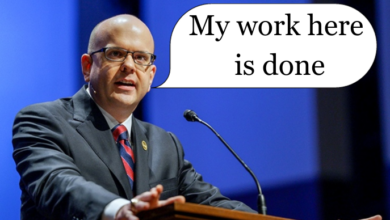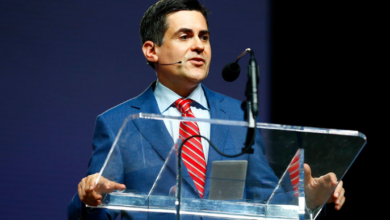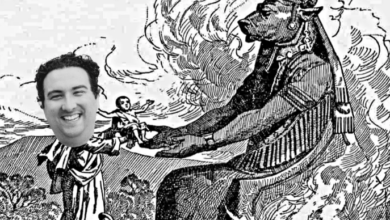The Two Faces of JD Greear on Homosexuality

In a stunning display of two-faced hypocrisy, former Southern Baptist President JD Greear spoke out against Andy Stanley’s drifting regarding homosexuality in a February 9th Gospel Coalition (TGC) article. In light of the unfolding drama regarding Stanley’s recent conference, TGC tweeted out the article. In that article, Greear makes the claim that while Stanley’s evangelistic heart is in the right place, he has chosen the wrong approach by downplaying scripture’s clear injunctions against practicing a gay lifestyle.
Setting the Scene
Before we delve into the specifics of the article, first consider Greear’s prior statements on homosexuality and examine them to see how his current position contradicts these past claims. If you’ve read our article on Al Mohler’s response to Stanley, then you can skip to the next section:
· 2015: Greear claimed, “the church ought to be the safest place on the planet for a teenager with same-sex attraction to reveal that… we must be the biggest advocates against discrimination and abuse against the gay community, and where we have not, we must repent.”
· 2019: Discussing transgenderism, Greear asserted that we should lie to transgender people by using their preferred pronouns in “a generosity-of-spirit kind of approach” over the truth-telling approach.
· 2019: In a sermon on Romans 1, Greear said (1) the Bible whispers about homosexuality compared to its shouts about materialism and religious pride; (2) being gay won’t send you to hell because being straight won’t send you to heaven; (3) it would be easier for a homosexual to enter the kingdom of heaven than for a religiously proud or materialistic person; and (4) we should advocate for the “dignity and rights” of gay people.
For each claim Greear made here, there are biblical passages revealing the opposite is true. It is also worth noting that TGC has likewise taken a loose approach to biblical truth on homosexuality. For example, in 2021 another TGC article claimed that wise Christians should “affirm the legal right of consenting adults to order their lives without fear” and “affirm their right to marry.”
It is clear that Greear and TGC have been willing to compromise on and downplay the truth when it comes to the topic of homosexuality, making them appear more appealing and moderate to a culturally influenced audience. With that background in mind, let us turn to the TGC article.
The Article
As the article opens, Greear sets up Stanley’s arguments which he will later critique:
“For Stanley, this isn’t about a cultural argument to be won; it’s about people to be reached. Relationships come before truth, he often says. Not at the expense of truth, he’d add—just before it. Hard conversations need to happen across coffee tables, not pontificated from stages or dogmatized in documents… So that’s the question: Does downplaying this issue give us an evangelistic advantage? Could it be considered faithful to the Great Commission—even necessary for reaching the next generation?”
In Greear’s mind, Stanley’s method of reaching homosexuals is to put relationship over facts, conversations over documents, and to downplay the issue of homosexuality. Notice how Greear is going to critique Stanley’s approach to putting relationships before truth. That method is exactly what Greear employed when he explicitly stated that we should use preferred pronouns instead of telling the truth to transgender people. Though Greear has tried to distance himself from his past comments, (he leaves those past comments up, and still directs people to them) he seemingly referenced Stanley’s words, “We’re not just called to defend truth but to win people,” and said he would still knowingly call transgender people by their preferred pronoun.
The first criticism Greear gives to Stanley’s approach is that it is functionally a sort of “don’t ask, don’t tell” policy that avoids talking about the issue of homosexuality:
“The most strategic thing I can do is clarify what we actually believe: it’s possible to love someone and treat her with respect, dignity, and honor even while disagreeing with her convictions. If I don’t deal with this awkward elephant in the room, this issue remains the silent “defeater” that keeps thoughtful seekers from considering meaningful union with the historic church.”
It is impossible to discern what the difference between this approach and Stanley’s could possibly be, since Greear does not elucidate what “the elephant in the room” actually is that should be said in gospel conversations with gay people. One may assume that this elephant is that homosexuality is, without qualification, a sin, but as we’ve seen, Greear has historically “whispered” on that subject. If Greear, even after “clarifying” his stance on pronouns, would use someone’s “preferred pronouns,” then it is hard to read a robust meaning into Greear’s words.
Secondly, broadly speaking, Greear evaluated Stanley’s approach from the Bible and found it wanting. There is much truth to what Greear says in this section. For instance, speaking of the Bible’s prohibitions on homosexual sins, Greear proclaims that, “It’s God’s gracious word of warning to a perishing world, and failing to make it clear would be the greatest unkindness we could inflict on our generation.” Failing to make it clear. This claim betrays a shocking lack of self-awareness or double mindedness on the part of Greear, like one face is condemning the other. He has no room to criticize Stanley’s lack of clarity on this issue when Greear is infamous for maintaining that the Bible “whispers about sexual sin” and that “being gay won’t send you to hell.” Despite clear warnings against practicing homosexuality throughout the Bible, including in Romans 1. Greear has downplayed the severity of a sin that is a clear sign of rebellion against God. If we are to hold Greear to his own standard, his rhetoric is the greatest unkindness we could inflict on a generation.
Although Greear wants to unhitch from Stanley’s theological wagon for now, Greear and Stanley’s approaches to the gay issue are not as different as Greear would like the audience to believe. Even in this article, Greear’s criticisms are couched in praise for Stanley’s overall body of work as a pastor, saying that Stanley’s “focus on reaching people…moved me deeply.”
In addition, both Greear and Stanley in 2015 spoke of their church being a safe place for gay youth to come out of the closet in a way that seems more affirming than correcting. This seems to be more than a simple case of simultaneous creation, and it appears that Greear, who made his statement nine days after Andy, picked up the talking point from Andy. Compare Greear’s, “the church ought to be the safest place on the planet for a teenager with same-sex attraction to reveal that, or to come out,” to Andy’s, “[churches should be the] safest place on the planet for students to talk about anything, including same-sex attraction.” This seems to be a case of one kid snitching on another to get out of detention, and may explain Greear’s praise of Stanley mixed into what is supposed to be a critique.
Just as Al Mohler’s critique of Stanley was self-defeating, so is Greear’s. Both men, along with TGC, are attempting to have a veneer of a more conservative, biblical-sounding stance on homosexuality, without clearly disavowing any of their previous contradictory statements. Andy has provided a good opportunity for Greear and Mohler to score some points from their conservative supporters, many of whom will not be aware of any prior statements these men made. At least, that appears to be the only logical conclusion unless either of these men fully retract, repent of their prior statements, and remove them. Clear teaching on this issue could have saved many out of the gay lifestyle had they heard the gospel unfiltered from a popular preacher like Greear. Then again, the same could be said for Stanley.



